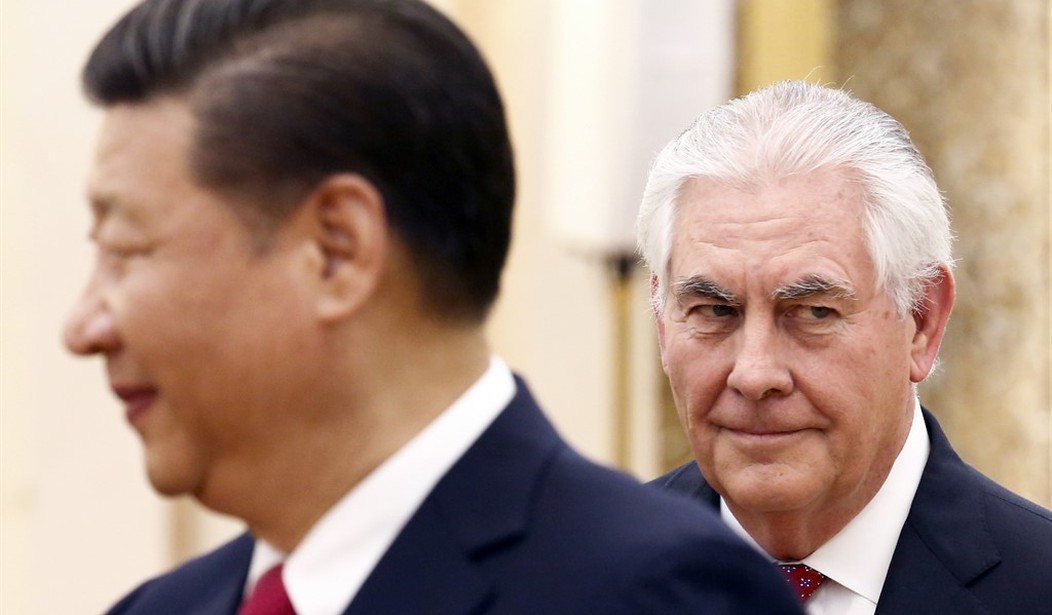Brevity is the soul of wit — and perhaps the start of a new approach to North Korea. Pyonygang conducted another missile test yesterday, which normally produces statements of outrage and reminders of international law and UN Security Council resolutions, all of which do nothing to deter future missile tests. Yesterday, however, Secretary of State Rex Tillerson offered a much different — and shorter — statement:
North Korea launched yet another intermediate range ballistic missile. The United States has spoken enough about North Korea. We have no further comment.
That comes in at a grand total of 23 words; in comparison, there are 13 words in the header of the State Department message. To call this terse is perhaps an understatement, especially in diplomatic circles, where language provides the only weapons government envoys use and usually employ in bulk. It literally says nothing other than acknowledge the launch of the missile.
So what message does Tillerson intend to convey with his brevity? CNN’s Chris Cillizza finds it far too ambiguous, but acknowledges that it might be intended to deprive the Kim regime of what it really wants out of these launches:
Tillerson is the country’s top diplomat — the person charged with finding solutions that go beyond simple rhetoric to these thorniest of foreign policy challenges. And his statement — such as it is — offers zero guidance as to what the US response will be.
Pyongyang wants Washington’s acceptance as a nuclear power — and to be dismissed in this way will be a blow, noted CNN’s Paula Hancocks in Seoul.
And two senior US officials tell CNN’s Barbara Starr that the message shouldn’t be interpreted as provocative. Instead, they say, it’s a signal the State Department will no longer put out routine statements after every North Korean provocation or missile launch.
But vagueness in diplomacy is a dangerous thing. Words matter. Misunderstandings can cause international incidents — or worse. How will North Korea and China interpret Tillerson’s comments? As a provocation? A dismissal? Something else entirely?
In one sense, the mystery is the message. Tillerson’s response fits very clearly into Donald Trump’s expressed approach to conflict, which is to keep enemies from knowing precisely what we intend to do. Trump made this point over and over again when it came to the Obama administration’s handling of Iraq and Afghanistan, and its insistence on timelines for withdrawal in both theaters, including the strategy against ISIS. Too much of our planning got put out on the pages of newspapers and in speeches before implementation, Trump argued, and he pledged to restore strategic and tactical mystery as president.
That’s not to dismiss Cillizza’s argument entirely. He’s right that diplomatic misunderstandings can lead to incidents and wars, but usually that comes from relaying the wrong message rather than not relaying any message. We ended up in the 1991 Gulf War because the US didn’t make it clear enough that we would take the side of Kuwait if invaded, and left the impression that the border conflict was not of interest to us. That was a case of saying too much rather than too little, and focusing on the wrong points. But still, it is possible to say too little and leave the same kind of misunderstandings that can lead to grave consequences.
Clearly, though, Tillerson’s not trying to reach the North Koreans with his minimalism. And that’s good, because it didn’t appear to have much impact on the Kim regime, as this morning’s missile tests demonstrated:
South Korea says North Korea has fired a ballistic missile into the waters off its east coast https://t.co/t9As8cp9Fi pic.twitter.com/FPcZFwImlz
— CBS News (@CBSNews) April 5, 2017
Tillerson’s message was for China, and Xi Jinping as he comes to the US this week on his first state visit with the new administration. Trump himself made Tillerson’s implicit statement much more explicit in an interview with the Financial Times:
In an interview with the Financial Times, the US president said he would discuss the growing threat from Kim Jong Un’s nuclear programme with Xi Jinping when he hosts the Chinese president at his Florida resort this week, in their first meeting.
“China has great influence over North Korea. And China will either decide to help us with North Korea, or they won’t,” Mr Trump said in the Oval Office. “If they do, that will be very good for China, and if they don’t, it won’t be good for anyone.”
But he made clear that he would deal with North Korea with or without China’s help. Asked if he would consider a “grand bargain” — where China pressures Pyongyang in exchange for a guarantee that the US would later remove troops from the Korean peninsula — Mr Trump said: “Well if China is not going to solve North Korea, we will. That is all I am telling you.”
That’s not saying too little or saying something too subtly. Trump and Tillerson are sending the message that it’s no longer business as usual with North Korea, and that message is specific to Beijing. If they want to be part of the solution, great — but the US is now seeking a solution rather than a prolongation of the status quo.
Is that wise? We’ll see, but the development of nuclear weapons and longer-range ballistic missiles means the status quo isn’t sustainable, probably not even in the short run. We don’t want to wait until the Kim regime can target the West Coast to confront the threat. Perhaps the change in attitude will cause Beijing to recalculate its interest in protecting Pyongyang, and that’s what Tillerson and Trump want to provoke with their change in rhetoric.







Join the conversation as a VIP Member